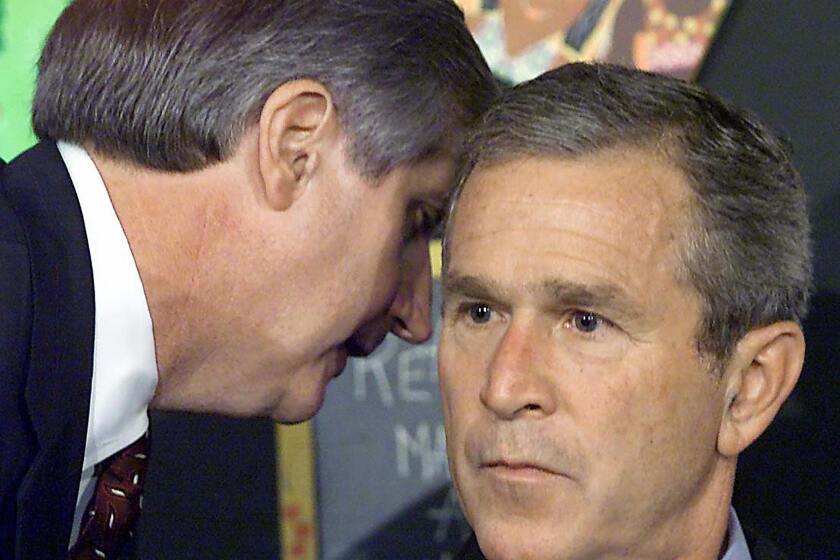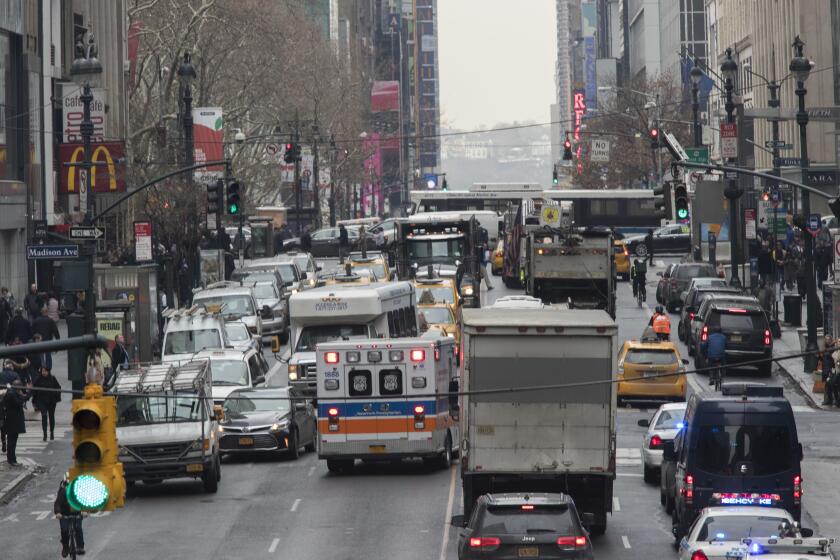Column: Americans don’t care about climate change. Here’s how to wake them up

- Share via
Why is the greatest threat to the planet of so little concern to most Americans?
It’s shocking, frankly, that global warming ranks 24th on a list of 29 issues that voters say they’ll think about when deciding whom to vote for in November, according to the Yale Program on Climate Change Communication. Only 30% of voters say they are “very worried” about it and more than two-thirds say they “rarely” or “never” discuss the issue with family or friends.
How can people be so blithely unconcerned when the clear consensus of scientists is that climate disruption is reaching crisis levels and will result not only in more raging storms, droughts, wildfires and heat waves, but very possibly in famine, mass migration, collapsing economies and war?
Sure, there are some obvious reasons for the apathy: High among them is that fossil fuel companies have spent decades pulling the wool over the eyes of Americans. And Republican politicians have been complicit.
Opinion Columnist
Nicholas Goldberg
Nicholas Goldberg served 11 years as editor of the editorial page and is a former editor of the Op-Ed page and Sunday Opinion section.
But that’s not the whole story.
To try to understand a little more, I had a conversation recently with David Fenton, a political activist who more than 40 years ago turned his hand to public relations and has now spent most of his life in the communications trenches, creating campaigns on behalf of social change and progressive causes.
Fenton, whom the National Journal once called “the Robin Hood of public relations,” argues that while yes, of course the fossil fuel companies are villains in a scam of historic proportions, the other side — the anti-climate change side — needs to acknowledge some serious strategic mistakes as well.
In his forthcoming book, “The Activist’s Media Handbook,” due out in November, Fenton says that the forces trying to rouse the world to fight climate change — including philanthropic foundations, environmental organizations and activist groups, among others — have by and large ignored the most rudimentary tenets of marketing and advertising, to their detriment and the planet’s.
Since my childhood at the dawn of the nuclear age, the existential risks facing humans have continued to grow.
That’s because they believe that the business of selling ideas is fundamentally dirty, manipulative and beneath them.
They’re convinced that data, truth and evidence are what matter, Fenton says. To them (and we’re talking here about lots of well-intentioned lawyers, scientists and people who studied the humanities), good ideas sell themselves.
So instead of spending money and resources on shaping public opinion, they keep commissioning more policy reports from think tanks and convening more global meetings of scientists — on the presumption that the steady accretion of irrefutable facts will ultimately prevail.
The other side knows better.
Bush was bad. But those were simpler days. We’ve seen something much worse since then.
“People at the fossil fuel companies and their allies go to business school where they learn cognitive and marketing science — and believe me, it is a science,” Fenton told me. “They learn how to sell products and services. They invest in defining messages and reaching people. Our side does not.”
What are some of these scientific techniques of persuasion and public communication that work so well?
Deliver simple messages, for one thing. In general, climate activists lean toward complexity and nuance because they don’t want to patronize or condescend or mislead by oversimplifying to their audiences.
Once you have a simple message, repeat it over and over. Did you know that consumers generally have to see an ad more than half a dozen times before they will be persuaded to buy a product?
Embed facts and data in what Fenton calls “moral stories that tug at the emotions.” Anyone who has ever watched TV ads knows that strategy can make arguments far more powerful.
A monkey got hold of a cellphone and dialed 911 from a zoo. How likely was that — and might she go on to type “Hamlet”?
Talk about what people care about. There’s been too much talk about the effect of climate change on polar bears, and not enough on what it means for humans.
Use language people understand. Research shows, Fenton says, that many people don’t understand the phrases “existential threat” or “net zero” or “climate justice.” They understand what “pollution” is, but not what an “emission” is — which suggests that it might make more sense to use the former term.
Now to be clear, I’m no fan of marketing either. I’m part of the problem Fenton is bemoaning . I’m reluctant to oversimplify or condescend to my audience, and I worry that heart-tugging, emotion-driven arguments are manipulative. I like to believe that adults can be persuaded with facts, science and rational arguments.
But I also know deep down that marketing works.
And if the fate of the Earth depends on delivering a simple but understandable, rousing and persuasive message, then I think it’s worth it. As Fenton notes, it’s not about manipulating people — it’s about un-manipulating them.
And the way to do it, he says, is with a big, well-funded campaign to build the public support, public understanding — and then the political will — required for social change.
New York is considering ‘congestion pricing.’ But how do you make sure such a plan does not put an inordinate burden on poorer people?
Here’s my only concern about Fenton’s argument: He believes messages shouldn’t be too downbeat because “sacrifice doesn’t sell.”
“I’m not saying there won’t be suffering,” he explains. “But multiple studies prove we can heat our homes, drive our cars, take vacations and have decent modern lives — if we just power them differently. But we have to hurry up.“
Is he right when he says the climate problem can be solved in a way that enhances economic prosperity? I hope so; that’d be great. But I worry — and this is just my opinion, not an expert’s analysis — that we’ve waited too long, and that to avoid the worst effects of climate change we are going to have to sacrifice, whether it sells or not. I take the gloomy approach.
Either way, we can all agree there’s an awful lot to be done. And Fenton is certainly right that you can’t mobilize people for war if they don’t know they’re under attack. Public education is obviously a missing piece of the puzzle.
Somehow we need to awaken a nation of sleeping, underinformed and insufficiently motivated citizens and persuade them to rise to the great challenge of modern times. To do that, the unmanipulation process needs to begin in earnest.
More to Read
Toward a more sustainable California
Get Boiling Point, our newsletter exploring climate change, energy and the environment, and become part of the conversation — and the solution.
You may occasionally receive promotional content from the Los Angeles Times.
















